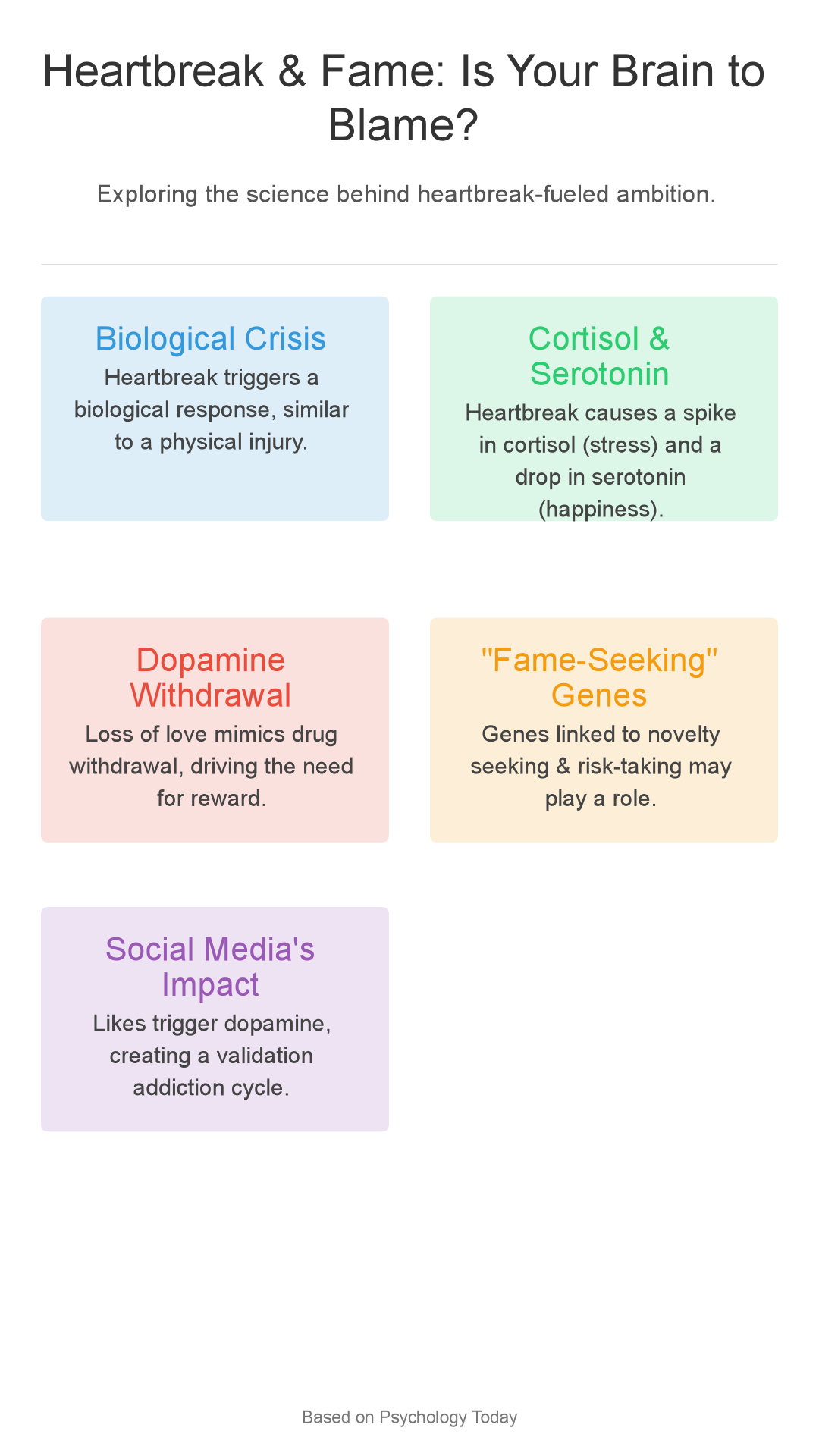
Is heartbreak just a painful emotion, or a secret superpower waiting to be unleashed? This video div
Ever feel like your ex inadvertently *catapulted* you towards the spotlight after breaking your heart? It sounds outlandish, but what if heartbreak ignited a biological drive, pushing you to seek recognition? Smash that like button if you’ve ever felt this magnetic pull, and follow for more mind-bending science explorations!
), but let’s be honest: after we split, I plunged headfirst into… well, *everything*.
Suddenly, I was saying “yes” to every public speaking opportunity, aggressively networking like my life depended on it, and posting an almost embarrassing number of perfectly filtered selfies. Was I just trying to prove something to him? Possibly.
Heartbreak as a Biological Stressor: The Chemistry of Pain and Ambition
Heartbreak isn’t just a feeling; it’s a full-blown biological crisis. Think of it as your body hitting the panic button.

The Neurochemical Cascade: Cortisol Spike and Serotonin Crash
When you experience rejection, your body is flooded with cortisol, the notorious stress hormone. This surge is like your internal alarm system blaring, “Danger! Loss! Abandonment!
” Simultaneously, serotonin, the “happy” neurotransmitter responsible for feelings of well-being, plummets.
Dopamine’s Paradox: Withdrawal and the Hunger for Reward
Here’s where it gets fascinating. Dopamine, the neurotransmitter linked to pleasure and reward, is deeply intertwined with romantic love.
When a relationship crumbles, you endure dopamine withdrawal, a process eerily similar to what happens when someone stops using addictive substances.
This withdrawal fuels an intense craving – not just for the lost relationship, but for *any* source of gratification.
Activation of Pain Centers: Heartbreak = Real Physical Pain
Research has revealed that the same brain regions that light up when you experience physical pain also activate during heartbreak. Seriously!
That agonizing ache in your chest isn’t just metaphorical; your brain is interpreting it as a genuine injury.
The “Fame-Seeking” Gene: Unpacking Genetic Predispositions
Okay, let’s be clear: there’s no single, definitive “fame gene. ” However, scientists have identified genes associated with personality traits that could make someone more inclined to pursue the spotlight.
Exploring Genes Linked to Novelty Seeking, Risk-Taking, and Social Drive
Genes associated with novelty seeking (like the DRD4 gene) can make individuals more drawn to new experiences and challenges, such as boldly venturing into the public sphere. Similarly, genes linked to risk-taking and social dominance might predispose someone to be more comfortable with the potential downsides of fame and more driven to attain a high social standing.
Epigenetics: How Heartbreak Stress Might Remold Gene Expression
Epigenetics explores how environmental factors can alter the way your genes are expressed.
Heartbreak is a profoundly stressful event, and it’s plausible that this stress could modify the expression of genes related to novelty seeking or social drive, making you more likely to chase fame.
The Role of Environment: Societal Pressures and Media’s Influence
Let’s not overlook the powerful influence of our environment. We live in a culture that often glorifies fame and success.
Social media relentlessly bombards us with images of seemingly perfect lives, feeding the hunger for validation and recognition.
Dopamine Hijack: Fame as a Substitute Reward System
Heartbreak can leave you feeling adrift and empty. The dopamine withdrawal intensifies the craving for connection and validation. Fame, in its own warped way, can offer a temporary Band-Aid.
The Allure of Social Validation: Likes, Followers, and Public Acclaim
Each like, comment, and follower on social media triggers a small dopamine release in the brain. This can be incredibly addictive, especially when you’re feeling vulnerable and yearning for validation.
Replacing the Lost Relationship with External Validation: A Risky Coping Strategy?
While seeking external validation can provide a fleeting boost, it’s not a sustainable or healthy way to cope with heartbreak.
Relying on likes and followers to fill the void left by a lost relationship can breed anxiety, insecurity, and a constant need for external approval.
The Addictive Spiral of Fame: Chasing the Next Dopamine Rush
The pursuit of fame can morph into an addiction, with individuals perpetually chasing the next dopamine rush from social media or public recognition.
This can trigger a vicious cycle of seeking attention, experiencing a temporary high, and then feeling empty again, leading to an even greater need for validation.
The Evolutionary Lens: Signaling Fitness and Resourcefulness
From an evolutionary perspective, heartbreak can be interpreted as a setback to your reproductive fitness.

Heartbreak as a Signal of Reduced Mating Potential
In evolutionary terms, being rejected can signal that you are not a desirable mate, potentially hindering your ability to pass on your genes. This can ignite a subconscious drive to elevate your status and attractiveness to potential partners.
Fame as a Signal of Desirability and Capability
Fame, or even a perceived boost in social status, can be a powerful signal of desirability and resourcefulness. By achieving fame, you are essentially broadcasting, “Look at me! I’m successful, popular, and valuable!
The Intricate Dance of Biology and Social Signaling
Our biology and social environment are in constant interaction. The biological stress of heartbreak triggers a drive to seek validation, and our social environment provides avenues to achieve that validation through fame and recognition.
So, circling back to my story… did my ex *actually* make me famous? Probably not directly.
But maybe, just maybe, that heartbreak flipped a biological switch, unleashing a drive to prove myself, to signal my fitness, and to find validation in a world that often equates attention with worth.
This entire exploration raises some profound questions, doesn’t it? What are the ethical implications of understanding and potentially manipulating these biological drives related to fame-seeking? And on a more personal level, what’s *your* take?
Have you ever noticed yourself or someone you know behaving differently after a breakup?
Eager to delve deeper into the science of attraction and influence? Subscribe to my newsletter for exclusive content and behind-the-scenes glimpses into the fascinating world of weird science!

Enjoyed this? Check out our YouTube channel for video versions!
Enjoyed this? Check out our YouTube channel for video versions!



